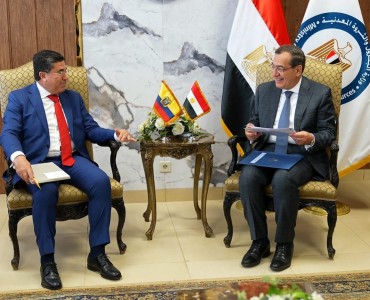Egypt is willing to negotiate a new agreement to supply natural gas to Israel under different prices and terms, the country’s Planning and International Cooperation Minister Fayza Aboulnaga said.
The Egyptian parties to the 2005 accord notified East Mediterranean Gas Co., which transports the gas to Israel, five times about past-due amounts before deciding to end the agreement yesterday, Aboulnaga told reporters in Cairo. The last notification was issued on March 31, she said.
Ampal-American Israel Corp. (AMPL), which owns 12.5 percent of EMG, said yesterday it had been informed by EMG that Egyptian General Petroleum Corp. and the Egyptian Natural Gas Holding Co. were terminating the gas-supply agreement.
The scuttling of the deal may offer an already unpopular post-Mubarak government the opportunity to collect political capital as it struggles against an Islamist-dominated parliament intent on passing a no-confidence motion. That could damage already shaky investor confidence in the country as it heads toward electing a new president on May 23, analysts said.
With or without the deal, “investors are genuinely very concerned about the direction that Egypt is going in,” Shadi Hamid, director of research at the Brookings Doha Center in Qatar, said in a telephone interview yesterday.
“There isn’t a responsible leadership. Whether it’s the Brotherhood or SCAF, there’s a sense that both of them are willing to play the nationalist” card, he said, referring to the ruling military council by its acronym. “I don’t think that’s reassuring a lot of outside observers.”
‘Willing to Renegotiate’
Egypt “is willing to renegotiate the deal, though it would be under a new contract, with new terms and prices,” Aboulnaga said. She didn’t say how much money was past due.
Mahmud Ghozlan, a spokesman for the Muslim Brotherhood who earlier lauded the move as affirming Egypt’s sovereignty, said talk of renegotiating the deal “doesn’t represent the Egyptian people and I don’t think the people will welcome it.”
The gas deal “has been a cause of a lot of pressure on the regime and on the military council,” said Emad Gad, a secular lawmaker who also heads the Israeli studies program at the Al- Ahram Center for Political and Strategic Studies, in an interview. “It was difficult for them to terminate it until a legal opportunity presented itself when the payments weren’t made.”
Egyptian officials said the decision had no political motivation, while Israeli officials yesterday said the move raised concerns about the peace agreement between the two countries. Israel later softened its tone, saying it hoped the matter was purely commercial.
‘Nationalist Credentials’
Oil Minister Abdalla Ghorab said in an e-mailed statement today that the termination was in line with the contract’s terms. “The dispute is merely a commercial one that does not reflect any political considerations or any state position,” he said.
Egypt’s government is “trying to assert its nationalist credentials,” said Hamid. “Being anti-Israel and anti-American is the lowest hanging fruit. It’s the easiest thing to do, it doesn’t take a lot of effort and there’s really no downside domestically.”
Egypt refused to authorize permits for eight U.S. non- governmental organizations, including the Carter Center, saying their work runs counter to the country’s sovereign interests, the state-run Middle East News Agency reported.
Source: Bloomberg











